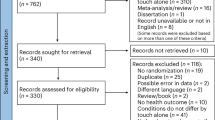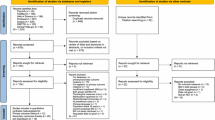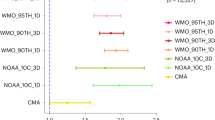Abstract
Objective:
To examine a possible relationship between obesity, job stress, and eating behavior in male Japanese workers.
Method:
A questionnaire on life style, job stress, and eating behavior was conducted with 208 male workers aged 19–60 years (33.7±12.3 years) in a manufacturing industry in Japan. Height and weight were measured in an annual health examination. The relation between obesity, job stress, and eating behavior were analyzed between 141 nonobese subjects (BMI ⩽24.9 kg/m2) and 67 obese subjects (BMI ⩾25.0 kg/m2).
Results:
Obesity was associated with psychological stress responses of tension/anxiety, especially tension. Tension/anxiety was also related to job demands positively and job latitudes negatively. The eating behaviors of subjects with tension/anxiety resembled those of the obese subjects.
Conclusions:
The present study suggests that obese male Japanese workers tend to be in a stressful state from high job demands and low job latitudes in the workplace. Such stressful conditions may affect eating behaviors to eat much and contribute to obesity. Stress management might be necessary in the workplace for the prevention of obesity among male Japanese workers.
This is a preview of subscription content, access via your institution
Access options
Subscribe to this journal
Receive 12 print issues and online access
$259.00 per year
only $21.58 per issue
Buy this article
- Purchase on Springer Link
- Instant access to full article PDF
Prices may be subject to local taxes which are calculated during checkout
Similar content being viewed by others
References
Bray GA . Risks of obesity. Endocrinol Metab Clin North Am 2003; 32: 787–804.
Rashid MN, Ruentes F, Touchon RC, Werner PS . Obesity and the risk for cardiovascular disease. Prev Cardiol 2003; 6: 42–47.
Sowers JR . Obesity as a cardiovascular risk factors. Am J Med 2003; 115: 37S–41S.
World Health Organization. Obesity: preventing and managing the global epidemic. Part I. The problem of overweight and obesity. WHO Technical Report Series No. 894. WHO: Geneva, 2000; 5–15.
James PT, Leach R, Kalamara E, Shayeghi M . The worldwide obesity epidemic. Obes Res 2001; 9: 228–233.
Yoshiike N, Nishi N, Matsushima S, Ito C, Ikeda Y, Kashihara H et al. Relationships between degree of obesity based on body mass index and risk factors for diabetes mellitus, hypertension, and hyperlipidemia (in Japanese). Himan kenkyu 2000; 6: 4–17.
Matsuzawa Y, Nakamura T, Takahashi M, Ryo M, Inoue S, Ikeda Y et al. The Examination Committee of Criteria for ‘Obesity Disease’ in Japan, Japan Society for the Study of Obesity: new criteria for ‘obesity disease’ in Japan. Circ J 2002; 66: 987–992.
Belkic KL, Landsbergist PA, Schnall PL, Baker D . Is job strain a major source of cardiovascular disease risk? Scand J Work Environ Health 2004; 30: 85–128.
Landsbergis PA, Schnall PL, Belkic KL, Baker D, Schwartz J, Pickering TG . Work stressors and cardiovascular disease. Work 2001; 17: 191–208.
Overgaard D, Gyntelberg F, Heitmann BL . Psychological workload and body weight: is there an association? A review of the literature. Occup Med 2004; 54: 35–41.
Netterstørm B, Kristensen TS, Damsgaard MT, Olsen O, Sjøl A . Arbejdsbelastning og kardiovasculaere risikofaktorer. Ugeskr Laeger 1993; 155: 1206–1210.
Kornitzer M, Kittel F . How does stress exert its effects – smoking, diet and obesity, physical activity? Postgrad Med J 1986; 62: 695–696.
Steptoe A, Cropley M, Griffith J, Joekes K . The influence of abdominal obesity and chronic work stress on ambulatory blood pressure in men and women. Int J Obes Relat Metab Disord 1999; 23: 1184–1191.
Jönsson D, Rosenberg A, Dotevall A, Lappas G, Wilhelmsen L . Job control, job demands and social support at work in relation to cardiovascular risk factors in Monica 1995, Göteborg. J Cardiovasc Risk 1999; 6: 379–385.
Greeno C, Wing RR . Stress-induced eating. Psychol Bull 1994; 115: 444–464.
Hellerstedt WL, Jeffery RW . The association of job strain and health behaviors in men and women. Int J Epidemiol 1997; 26: 575–583.
Laitinen J, Ek E, Sovio U . Stress-related eating and drinking behavior and body mass index and predictors of this behavior. Prev Med 2002; 34: 29–39.
Ng DM, Jeffery RW . Relationships between perceived stress and health behaviors in a sample of working adults. Health Psychol 2003; 22: 638–642.
Bray GA, Popkin BM . Dietary fat intake does affect obesity!. Am J Clin Nutr 1998; 68: 1157–1173.
Kato M . Research reports on stress in the workplace and its effects on health, Ministry of Health, Labor, and Welfare ‘Study on prevention of work-related disease’ (in Japanese). Preventive Medicine and Public Health. Tokyo Medical University: Tokyo, 2000.
Sakata T . Treatment Manual for Morbid Obesity (in Japanese). Ishiyaku Shuppan: Tokyo, 1996.
Yoshimatu H, Sakata T . Behavioral therapy for morbid obesity (in Japanese). Nihon Naika Gakkai Zasshi 2001; 90: 902–913.
Ookuma K . Efficacy of new devices for behavior modification therapy for obesity (in Japanese with English abstract). Nippon Rinsho 2001; 59: 608–612.
Karasek Jr RA . Job demands, job decision latitude, and mental stress: implications for job redesign. Admin Sci Q 1979; 15: 379–405.
Johnson JV, Hall EM . Job strain, work place, social support, and cardiovascular disease: a cross-sectional study of a random sample of the Swedish working population. Am J Public Health 1988; 78: 1336–1342.
Karasek R, Baker D, Marxer F, Ahlbom A, Theorell T . Job decision latitude, job demands, and cardiovascular disease: a prospective study of Swedish men. Am J Public Health 1981; 71: 694–705.
Ishizaki M, Morikawa Y, Nakagawa H, Honda R, Kawakami N, Haratani T et al. The influence of work characteristics on body mass index and waist to hip ratio in Japanese employees. Ind Health 2004; 42: 41–49.
Yamazaki T . Relation of lifestyle, working posture and job category to body mass index change in young male workers (in Japanese). Nihon Koeishi 1995; 42: 1042–1052.
Vasse RM, Nijhuis FJN, Kok G . Association between work stress, alcohol consumption and sickness absence. Addiction 1998; 93: 231–241.
Liebman M, Pelican S, Moore SA, Holmes B, Wardlaw MK, Melcher LM et al. Dietary intake, eating behavior, and physical activity related determinants of high body mass index in rural communities in Wyoming, Montana, and Idaho. Int J Obes Relat Metab Disord 2003; 27: 684–692.
Ma Y, Bertone ER, Stanek III EJ, Reed GW, Hebert JR, Cohen NL et al. Association between eating patterns and obesity in a free-living US adult. Am J Epidemiol 2003; 158: 85–92.
Acknowledgements
This study was conducted with aid for the health promotion field from a medical research and health promotion activities grant for 2002 from the Aichi Health Promotion Foundation.
Author information
Authors and Affiliations
Corresponding author
Rights and permissions
About this article
Cite this article
Nishitani, N., Sakakibara, H. Relationship of obesity to job stress and eating behavior in male Japanese workers. Int J Obes 30, 528–533 (2006). https://doi.org/10.1038/sj.ijo.0803153
Received:
Revised:
Accepted:
Published:
Issue Date:
DOI: https://doi.org/10.1038/sj.ijo.0803153
Keywords
This article is cited by
-
Association between obesity, common chronic diseases and health promoting lifestyle profiles in Hong Kong adults: a cross-sectional study
BMC Public Health (2020)
-
Fast eating is a strong risk factor for new-onset diabetes among the Japanese general population
Scientific Reports (2019)
-
The psychology of organizational and social sustainability
Frontiers of Engineering Management (2019)
-
Use of various obesity measurement and classification methods in occupational safety and health research: a systematic review of the literature
BMC Obesity (2018)
-
Stunted PFC activity during neuromuscular control under stress with obesity
European Journal of Applied Physiology (2016)



